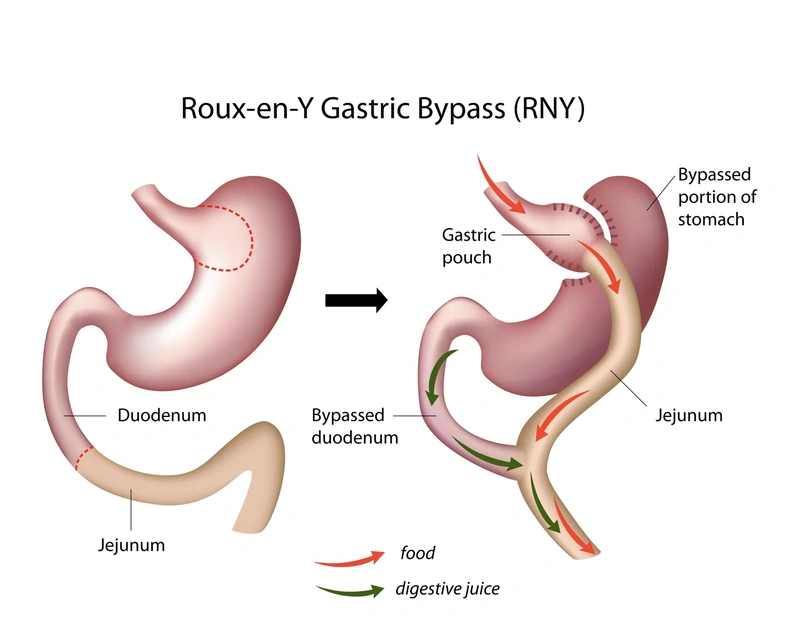
Gastric Bypass RNY
Gastric bypass keyhole bariatric surgery is considered the world’s leading method for effectively treating morbid obesity.
Gastric Bypass RNY Surgery
In gastric bypass Roux-en-Y surgery the stomach is made smaller by creating a new small pouch of 30-50 ml from the upper part of the stomach using surgical staples. The new pouch is connected directly to the middle portion of small intestine, bypassing the rest of the stomach and the upper portion of the small intestine.
Functions of gastric bypass surgery are:
- Restriction and metabolic changes. Decreases the amount of food a person can intake during one meal and changes the gut hormones;
- Absorption of nourishment will be much slower, you will consume considerably fewer calories.
The surgery is performed under general anaesthesia using laparoscopic/keyhole surgery method by making 5 small incisions and using specific instruments and a camera to guide the surgery.
What To Expect After A Gastric Bypass Surgery
Following the operation you will remain in the hospital for up to 3-4 days for a safe flight back home, if the surgeon doesn’t specify otherwise.
Because the anatomy of your digestive system will be altered during the operation, you will have to follow your doctor’s recommendations regarding your lifestyle, subsequent diet, supplement intake and physical activity.
Success Rates Of Gastric Bypass Surgery
Recent studies show up to 93% long term success rate at post gastric bypass patient groups.
Key To Long Term Success
- Proper eating. Surgery limits the amount of food you can intake, and it becomes extremely important to chose food quality over quantity. Following long term dietary recommendations, learning and understanding the product value is a key to long term success of any type of weight loss surgery.
- Regular physical activity – consistent exercise is another key of a long term success of the weight loss surgery.
- Mindset change and control – emotional eating is one the most popular issues. We encourage our patients finding professional advice and help to solve this issue.
- Portion control. Use side plate for your meals.
- Proper hydration.
- Vitamin and mineral intake.
Benefits Of Gastric Bypass Surgery
In the year following a gastric bypass surgery, patients lose in average 70% of their excess body weight. They also have significant improvement (80-95%) in such diseases as:
- diabetes type 2
- sleep apnea
- bone and joint diseases
- asthma
- dyslipidiaemia
- depression
- infertility and PCOS
- migraine
- liver disease
Even though physicians recommend bariatric surgery as a health improving tool, we can also add extremely positive psychological and physical effects, longevity and improvement of life quality in general.
Who Qualifies For Gastric Bypass Surgery
- Individuals in ages of between 18 and ~62 years, depending on health condition.
- Individuals with BMI>40;
- Individuals with BMI>33 suffering from diabetes type;
- Individuals with BMI>35 suffering from other obesity related health conditions like GERD (gastro esophageal reflux disease), hypertension, joint & back problems, sleep apnea and other.
Is Gastric Bypass Surgery Reversible?
Yes, technically the gastric bypass surgery is reversible. However, reversal will lead to weight regain and return of co-morbid conditions. If the reversal is considered due to complications, probably it would be more recommended to revise. Each situation should be assessed carefully and personally.
Gastric Bypass Surgery Potential Complications And Risks
Early risks:
- Leakage from the stomach or intestine through the staples which can cause abdominal infection.
- Blood clots caused by surgery – Deep Vein Thrombosis, Pulmonary embolus. A rare complication. To avoid these risks, post-operative patients are given medications to “thin the blood” to help prevent formation of clots. Walking after the surgery is essential to avoid blood clots.
Later risks:
- Formation of ulcers in the stomach or small intestine. This is an uncommon complication. Ulcers are more common in smokers and patients taking medications for arthritis.
- Dumping syndrome. Usually can be caused by eating too fast or too much, or drinking and eating the same time, or maybe after eating certain types of food. You should follow recommended diet plan and monitor feelings after bringing back every product to your diet.
- Obstruction of the opening of the stoma. This is also a rare complication (1 in 100 patients). It can occur when a piece of food lodges in the stoma. If this happens, the piece should be removed endoscopically from the mouth into the stomach;
- Vitamin and/or iron deficiency. To avoid vitamin deficiency, follow your doctors or dietitian’s supplement recommendations and do not forget about regular follow-up by your GP;
- Bowel function changes (sometimes diarrhoea, but more often constipation after gastric bypass surgery;
- Dehydration – you will need to drink at least 1.5 – 2l of water a day in the months following surgery;
- Gallstones – can be formed following rapid weight loss;
- Dyspepsia (indigestion) – incomplete digestion of food. If this happens to you, change your diet, avoid greasy foods, drink more water;
- Nausea and vomiting – one of the most common side effects of bariatric surgery. Following the doctor’s orders regarding your bariatric diet will typically fix or improve the problem;
- Intolerance to certain foods – there will be certain diet habits you’ll need to maintain.
Your safety and wellbeing in long term is our top priority! We comply with the highest EU quality standards for patient care, surgery, equipment and cleanliness in Sigulda Hospital.
SEND YOUR INQUIRY and get to know more about our weight-loss surgery offer!